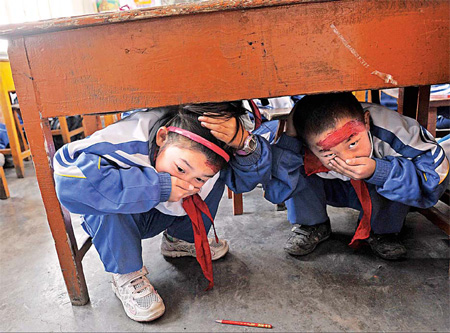Sichuan lessons applied in Yushu
 |
|
Students at a school in Yinchuan, capital of the Ningxia Hui autonomous region, take part in a drill to learn what to do in the event of an earthquake. |
Aside from a swifter response from rescuers, a better grasp of technology has also enabled the government, media and ordinary citizens to interact in virtually real-time and on an unprecedented scale.
It took the China International Search and Rescue team (CISAR) less than an hour after the tremor in Qinghai to publish the first micro-blog detailing its activities. In the days that followed, staff posted more than 300 updates.
In addition to CISAR, residents and media reporters in the earthquake zone also used blogs and micro-blogs to tell the world what was happening there. In an effort to reach the largest audience possible - China now has more than 400 million netizens - the Qinghai government posted online appeals for relief materials on Tianya, a popular news website.
"Increased interaction between government agencies and the public in the wake of the Qinghai tremor has been a significant progress," said Mao Shoulong, a professor of public policy at Renmin University of China. "Not only did the government proactively release information in a comprehensive manner, but the public was also able to forward their inquiries and advice to the government in a more efficient way."
The rising influence of social groups is also regarded as another vital legacy of the Sichuan earthquake.
In a pioneering move, the State Council's Leading Group for Poverty Alleviation Office last year incorporated Oxfam - an international non-governmental organization (NGO) aimed at finding long-term solutions to poverty, hunger and social injustice - into Sichuan's reconstruction plans.
"They (State officials) endorse our global experience and financial management mechanisms," said Wang Binbin, a press officer with Oxfam's Beijing office.
But even in the face of phenomenal development, political concerns and bureaucratic obstacles still stifle the growth of NGOs in China, say experts.
Zhai Yan, director of the volunteers' support center at YouChange, a private foundation involved in reconstructing the city of Mianzhu, warned of the dangers of becoming "institutionalized".
The volunteers should represent the NGO to conduct independent social work, instead of acting as additional forces to the government's human resources department, which often tends to be the case, she said. "The members in our unit are now de facto employees of the government. We were incorporated into the establishment, when in fact we were supposed to cooperate."
Tang Rong, one of YouChange's coordinators in Mianzhu, argued that it is only natural for NGOs to adhere to local government requests, since "NGOs are based in places for just that reason: To help it develop according to its own needs".
"The (Sichuan) earthquake was a test for the government when it came to dealing with NGOs," said Zhu Xiaofang, a Mianzhu government official. "That was something we had no prior experience in. There's no way we can limit the development of these NGOs."
 0
0 







Go to Forum >>0 Comments